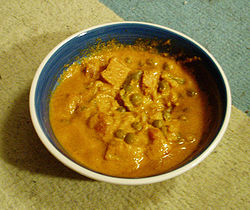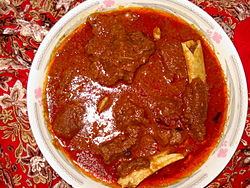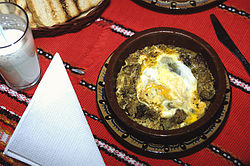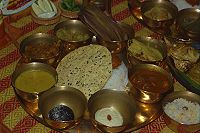- Korma
-
Korma 
KormaOrigin Place of origin India, Pakistan Dish details Main ingredient(s) yoghurt, cream, coconut milk Korma (sometimes spelled kormaa, qorma, kavurma,kavarma, khorma, or kurma) is a dish originating in South Asia or Central Asia[1] which can be made with yoghurt, cream, nut and seed pastes or coconut milk; it is usually considered a type of curry.[1] Both vegetarian and non-vegetarian kormas exist.
Contents
History
Korma has its roots in the Mughlai cuisine[1] of modern-day India and Pakistan. It is a characteristic Indian dish which can be traced back to the 16th century and to the Mughal incursions into present-day Northern India, Pakistan and Bangladesh. Classically, a korma is defined as a dish where meat or vegetables are braised with water, stock, and yoghurt or cream (the name is in fact derived from the Hindi and Urdu words for "braise").[2] The technique covers many different styles of korma.
The flavour of a korma is based on a mixture of spices, including ground coriander and cumin, combined with yoghurt kept below curdling temperature and incorporated slowly and carefully with the meat juices. Traditionally, this would have been carried out in a pot set over a very low fire, with charcoal on the lid to provide all-round heat. A korma can be mildly spiced or fiery and may use lamb, chicken, beef or game; some kormas combine meat and vegetables such as spinach and turnip. The dopiaza, featuring a large quantity of onions, is a form of korma, as is the Kashmiri dish rogan josh or rogan gosht. The term Shahi (English: Royal), used for some kormas indicates its status as a prestige dish, rather than an everyday meal, and its association with the court.
United Kingdom korma
A dish called "korma" is very popular in Pakistani/Indian restaurants in the United Kingdom. In the UK a korma usually refers not to a particular cooking technique but to a curry with a thick, cream-based sauce or gravy. The korma popularised in UK curry houses is invariably mildly spicy and may often feature nuts, usually almonds or cashews, and coconut.
Navratan korma is a vegetarian korma made with vegetables and either paneer (cottage cheese) or nuts - or sometimes both.[3][4] "Navratan" means nine gems, and it is common for the recipe to include nine different vegetables.[5]
Cooking technique
The korma style is similar to all other braising techniques in that the meat or vegetable is first cooked briskly or seared using a high heat and then subjected to long, slow cooking using moist heat and a minimum of added liquid. The pot may be sealed with dough during the last stages of cooking.
Chicken or other poultry requires fairly thorough coating with the spice mixture, or marinating, and heating evenly in cooking oil or ghee at a high enough temperature to cook through, followed by a cooling period after which yoghurt and/or cream may be added. However, lamb requires a very brief initial searing to brown the surface of each piece, followed by a braising at a continuous low temperature. This prevents the lamb from toughening, a particular problem if a large amount is to be cooked; temperature heterogeneity is difficult if the mixture is left to stand. This low cooking temperature is usually quite difficult to achieve, but if done correctly results in a memorable dish.
The korma can make use of a technique called bhogar: later in the cooking, additional spices are mixed with heated ghee and then combined with the sauce formed by the braising; the pan is then covered and shaken to release steam and mix the contents.[6]
There is a wide variation between individual korma and other "curry" recipes. Chilli and ginger are often used, but the precise method of preparation results in widely different flavours. Bay leaves or dried coconut may be added, the latter being a predominantly South Indian flavouring.
A korma pilau is a rice and meat dish made with braised meat.[7]
References
- ^ a b c Amjum Anand (2007), My Chicken Korma (Times Online)
- ^ Singh, D. Indian Cookery, Penguin, 1970, pp.24-25
- ^ Encyclopaedia of tourism resources ... - Google Books. books.google.co.uk. http://books.google.co.uk/books?id=vdMNBxOsvrUC&pg=PR20&dq=navratan+korma#v=onepage&q=navratan%20korma&f=false. Retrieved 2010-06-18.
- ^ "Navratan Korma - Nine-gem Curry". about.com. http://indianfood.about.com/od/vegetarianrecipes/r/navratankorma.htm. Retrieved 2010-06-18.
- ^ Dishes & Desserts - Google Books. books.google.co.uk. http://books.google.co.uk/books?id=PpHxAMX7m60C&pg=PA13&dq=navratan+korma#v=onepage&q=navratan%20korma&f=false. Retrieved 2010-06-18.
- ^ Singh, p.26
- ^ Singh, p.154
Categories:
Wikimedia Foundation. 2010.




